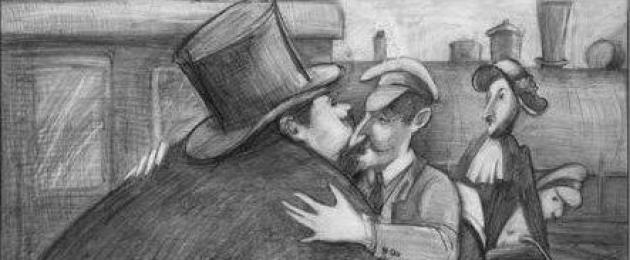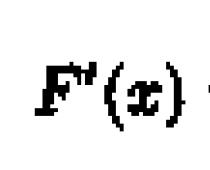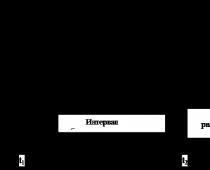The main characters of “Thick and Thin” are childhood friends, they once studied together, played pranks together, both retained many warm memories of that carefree period. The description of the appearance of the characters is the main antithesis in the work. The author does not immediately introduce the names of the characters into the story, at first he calls them “thick and thin”. This emphasizes not only the external, but also the internal characteristics of the characters, setting the reader up for the fact that they met people between whom misunderstanding is inevitable. In Chekhov's story "Thick and Thin" servility, the habit of groveling before the highest ranks, is ridiculed. The instant metamorphosis that happened to the “thin” and his entire family is so disgusting and irreversible that the “fat” tends to leave his old friend, he is “sick”.
Characteristics of the heroes “Thick and thin”
main characters
Fat (Misha) |
A full, good-natured person who loves to eat well. Behaves easily and naturally. He rose to the rank of Privy Councilor, has "two stars". He recalls school pranks with joy, sincerely glad to meet a childhood friend. Despite his position, he keeps himself simple, does not recognize servility among old friends. |
Thin (Porfiry) |
A thin man with a mountain of bags of suitcases and cardboard boxes in his hands. His family is his reflection. From the memoirs of Porfiry himself, we learn that in the gymnasium he was teased because he was sneaky. Talking about himself, he complains about low income, dissatisfied with his position. It seems that Porfiry is sincerely glad to meet his friend, but something keeps him in suspense. How to behave with Mikhail, his family cannot decide. They hide behind the head of the family. After Porfiry finds out that Misha has become a secret adviser, his face changes beyond recognition, and apart from nervous giggles and stutters, he can’t squeeze anything out of himself. |
Minor characters
In the work “Thick and Thin”, the characters meet by chance at the station, the “second” acquaintance occurs at the moment when Mikhail informs his friend about what post he occupies. At this moment, the image of Porfiry undergoes such grandiose changes that a new person. The transformation so strikingly reveals the character of the "subtle" and his family that further dialogue between friends is impossible. The situation positively characterizes the well-fed and well-to-do Mikhail, who turns out to be more humane and simpler than Porfiry, who wishes for life. The author urges to maintain one's own dignity, self-respect, and not to evaluate a person by his status in society.
useful links
See what else we have:
Artwork test
In 1883, a short story "Thick and thin" by A. Chekhov appeared in the "Shards" magazine. Short and concise in content, it is filled with deep meaning. The author addresses in it the problem of servility and servility, which has more than once become an object of criticism in Russian literature.
Composition and content (brief)
Fat and thin, former classmates at the gymnasium, met by chance at the station. The mention of Nikolaevskaya railway in the first sentence (this is a compressed exposition) suggests that the heroes of the story are officials. A. Chekhov does not give a detailed description of them, but the exact ones immediately clarify what is happening. For example, the mention that the fat one smelled of “sherry and fleur-d’orange” is a sign of wealth, while the thin one smelled of “ham and coffee grounds” helps to determine at what step of the social ladder each of the characters was. In addition, the latter was hung with boxes and suitcases - probably did not have extra funds or spared money for a porter.
The first to notice a former friend was fat. His joyful exclamation addressed to Porfiry becomes the plot of the action. They have not seen each other since childhood, and it is quite natural that a conversation is struck up between them. Short, but sufficient for the reader to get a complete picture of life position each of the friends.
The climax is the moment when the thin one finds out what heights his friend has reached in life. Misha immediately turns into "Your Excellency", and Porfiry himself unnecessarily becomes an obsequious and fawning little man, which further analysis will show.

Thick and thin during dialogue
Porfiry, seeing a childhood friend, was simply stunned. Former friends hugged and “kissed” three times - the author deliberately uses lofty vocabulary here to give the whole scene a mocking character.
Thin was extremely talkative and began boastfully talking about his life. He introduced his wife and son, while Nathanael first thought and only then took off his hat. He said that over the years of service in the office he had reached the rank of collegiate assessor. And he also makes and sells cigars - an additional profit to his salary. However, his joy and delight from the meeting disappeared at the same moment when he found out that his friend was “probably already a civilian?” - rose to the rank of Privy Councillor. Thin at first turned pale and as if petrified, after which he put on the widest smile on his face, probably best suited for a conversation with an important face. He immediately seemed to shrink, trying not to attract too much attention to himself. The same thing happened to his family and numerous bundles and cartons: they all suddenly shrank and wrinkled. Reverence, in any situation and in front of everyone who was even a little more significant, became the norm for a petty official - this is the conclusion of Porfiry's behavior and his analysis.
Thick and thin parted completely different from how they met. The Privy Councilor, laconic and self-confident, but showing cordiality, was about to object to something, and then simply turned away, shaking his hand in parting. He was sick of such a change in his comrade.
And the whole family froze in a “pleasant stun”.

In childhood
The characters of the heroes and the memories of Porfiry will allow us to evaluate the analysis. Fat and Thin spent several years together at the gymnasium. Even then, the superiority of the first, nicknamed Herostratus, was obvious - in ancient times, a Greek with that name destroyed one of the wonders of the world with fire. Misha, on the other hand, burned the state book with a cigarette - he obviously wanted to win authority over his classmates.
The thin one was called Ephialtes, as he often taunted. And this name - a traitor to the Spartans at the Battle of Thermopylae - has been preserved in history. Years passed, and one remained handsome, "little soul" and dandy, lived sedately and in abundance. Another - "thanks" to the ability to please and many years of work, managed to rise to a low rank, which nevertheless gave a noble title. And now this difference between the former friends was exposed even more, and the constant fear of the authorities made Porfiry tremble in front of the one who a few minutes ago was only a “childhood friend”.
and part role
The main technique that Chekhov uses in the story "Thick and Thin" is the antithesis. The opposition of the characters is found in everything, including the title: from the mention of what everyone ate for lunch, to the manner of behavior and speech. Thin is indicative in this regard. If at the beginning of the meeting we hear from him: “you”, “my dear”, “childhood friend”, then later his tone changes to reverent and respectful. To the meaningful "your excellency", "such nobles, sir", "have mercy, sir", "hee-hee-hee", etc. pauses are added, as if it suddenly became difficult for him to speak.
In the second part of the story important role to reveal the image of a collegiate assessor, metaphor (“petrified”), comparison (“it seemed ... sparks rained from his face and eyes”), personification (boxes, knots “shrank, grimaced”). So in the story "Thick and Thin" Chekhov ridicules the hero's servility, cowardice, opportunism. Moreover, Thin does this unconsciously, out of habit, in words former comrade: "Well, that's enough ... And why this tone?".

The moral value of the work
The content of the story and its analysis cause sad thoughts in the reader. “Thick and thin” is an example of how self-deprecating a person can be in an effort to curry favor and please. A great writer and connoisseur human soul, A.P. Chekhov, for a century and a half now, he has been urging us to look at ourselves and those around us so that society can finally get rid of the vices that hinder the establishment of healthy and sincere relations between people.
Thin is one of the two main characters in Anton Pavlovich Chekhov's satirical story called "Thick and Thin".
The man's name is Porfiry. He has a wife, Louise, who gives private music lessons, and a son, Nathanael, who is in the third grade at the gymnasium. Thin takes the post of a petty boss in one of the government departments and receives a very modest salary for his work, for which he cannot afford to purchase various material benefits. To replenish the family treasury, he makes cigarette cases on his own and sells them. The man is insecure and even somewhat cowardly. He is unusual for an honest, frank expression of his own opinion, he is used to adapting to more influential people, whom he treats with reverent reverence.
Thin can not boast of a high position in society or other social privileges, so he tries in every possible way to please people who are more successful and have achieved more than him. When he meets railway station with an old comrade, Tolstoy, his complete opposite, then at first he talks to him as to an equal. The man is calm and very happy about the unexpected meeting. He even allows himself to show some arrogance, showing off his wife and son's academic achievements.
But, as soon as the Subtle Lord found out that his interlocutor had high rank and enjoys universal respect, he instantly changed his manner of behavior and conversation, began to grovel before Tolstoy, to flatter and praise him in various ways. Porfiry simultaneously envies and admires an old acquaintance. His speech becomes slurred, incoherent and confused, the tone is replaced by a much more respectful one, now he addresses Tolstoy exclusively “Your Excellency”. Even during parting, Thin does not dare to shake the hand extended to him, takes only three fingers of Tolstoy and bows low. By his behavior, Thin achieves the opposite of the expected effect: his interlocutor is discouraged, he is unpleasantly feigned friendliness and sycophancy.
With the help of this character, Chekhov, in his characteristic sarcastic manner, describes human duplicity and the problem of ceremonial worship, which does not lose its relevance even in modern world. The author gives his own assessment of such behavior, he considers it unworthy, absurd and base.
Composition about Thin (Porfiry)
A.P. Chekhov - master short stories. One such short story is the story "Thick and Thin". A lot of problems are raised in this work, but in order to deal with them, it is worth paying attention to one of the main images of the story - the image of Thin.
In fact, Thin is called Porfiry. Outwardly, he is thin, thin and unattractive. Reading the story, the reader learns that Porfiry works as a petty official and receives a small salary, because of the difficult financial situation, Thin still makes cigarette cases and sells them for a ruble, and his wife gives music lessons. This is how the Porfiry family lives. But most main feature in the image of this hero, Chekhov made servility and hypocrisy.
Thin is used to curry favor with people who are taller than him. social status. The reader understands this when Thin meets his old friend Tolstoy. At first, the friends were very happy to meet and talked on an equal footing, but when Thin finds out that Tolstoy occupies a high position, he immediately changes his friendly tone to "slavish". He addresses a friend as “you”, tries in every possible way to please with a word and pushes his family to this. Thin is nervous, his speech becomes confused and unclear, envy is heard in his voice, he praises his friend, flatters. Reverence prevents the Subtle from behaving freely and relaxed even in the company of a close friend, he is a downtrodden, cowardly person who is afraid to say something wrong in the presence of people higher than him in rank.
Thus, he loses his self-respect when he meets Tolstoy. Thin immediately tries to adapt to a friend, the rank of a friend is more important for him than Tolstoy's personality itself.
Of course, such a character can not be treated positively. You can't respect a person who doesn't respect himself. The image of Thin is the image of a person for whom rank and money are above all: friendship, family, honor. Chekhov, introducing the image of Tony into the story, shows how low servility is and how pathetic a person who has no self-esteem and self-respect. You can't be like this low man, even despite life's difficulties, a person must be able to maintain honor. In addition, human qualities and feelings should be above all ranks and awards.
3 option
The work is dedicated to ridiculing human shortcomings, in particular, subservience and servility.
The plot of the story is quite simple. Two childhood friends met by chance at the railway station. Porfiry, who also appears as thin, is a poor official whose career has developed worse than that of his old friend Misha (aka Tolstoy).
Initially, the conversation proceeded in the usual way: old school friends share memories and tell each other about their current life. However, as soon as Tolstoy told that he had achieved great success in climbing the career ladder, bypassing the ranks of Thin, the latter felt fear and reverence for him. Porfiry switched to "you" and began to show excessive respect, as before his immediate superiors.
The author emphasized with a number of details the embarrassment and involuntary fear of an old friend that gripped the less fortunate official with a number of details. Not only Tonky himself, but also his son, a high school student, for whom there was absolutely no point in being afraid of an official, as if he was not in the service, he drew himself up to attention, buttoned up his uniform gymnasium tunic. This clearly demonstrates that worst qualities human nature, inherent in Porfiry, such as servility and, importantly, cowardice not only impregnated him himself, but are broadcast by him to those around him.
Moreover, it is clear that Subtle is not a cunning careerist or intriguer who subjugates his life to achieving material success and climbing the career ladder. He is not a prudent person who is simply deprived of honor, who receives some pleasure from the fact that by manipulating people, he achieves power over them. Porfiry's actions are irrational. In this case, he simply does not win anything, since he is not connected in any way with his old childhood friend. Moreover, the absence of service relationships between them, on the contrary, played into the hands of Thin. His old friend feels embarrassed by the servility of his interlocutor and tries (though unsuccessfully) to stop showing excessive respect. Having failed, however, in this, Tolstoy ends the conversation. If they later turned out to be employees in the same department, Tolstoy's disgust, which Tolstoy's behavior aroused in him, would have forced him to reduce communication to a minimum.
In the image of Thin Chekhov portrayed the classic "little man" - an ugly phenomenon of Russian reality, a man imbued with fear and servility, poisoning life for himself and those around him.
Some interesting essays
- Sergei Platonovich Mokhov in the novel Quiet Don image and characterization essay
As we know, in such epic novels as The Quiet Flows the Don, not only the main characters are important, but also the secondary ones. One of the most striking secondary characters is Sergei Platonovich Mokhov, a very rich merchant of the Tatarsky farm.
- Analysis of Gorky's story Konovalov essay
In this story, it is written that in the bakery where Maxim worked, the owner hires another baker, whose name is Alexander Konovalov. A man in his thirties, but a child at heart. Konovalov tells Maxim about his many girls
- Composition based on the painting by Ismailova Kazakh waltz
Many paintings and works can tell and describe the customs and traditions of each nation. One of these works is the painting "Kazakh Waltz". The author of the work is Gulfairuz Ismailova
We spend a lot of time at school, even more than at home. As many teachers say: "school is a second home." When we think about it, we really understand that this is so. Going to first grade, the guys do not quite understand what awaits them next.
In the story of A.P. Chekhov, the main characters are two childhood friends, Misha and Porfiry. The title of the work is ambiguous. The author shows us both the appearance of the characters and their character. Thin Porfiry was a representative of the "little people" who from childhood were educated about humility and servility. Fat Misha is a person of high rank, but treats a childhood friend as an equal to himself.
What these two have in common is that they are both approximately middle-aged, elementary education and they have many shared memories of their childhood friendship.
If everything is clear about the marital status of the thin story, since he was at the station with his wife and son, then whether his friend has a family is not known. What they have in common is that both of them serve as officials, but the difference is that they have a different rank. If the thin Porfiry wore the low rank of a collegiate assessor, then the fat Misha rose to the rank of Privy Councilor, whose rank is much higher than that of his friend. The number of orders these friends have is different: Porfiry has one, and Misha has two.
The wealth of friends is also different. Porfiry receives a small salary, and he has to earn extra money by making cigarette cases from wood with his own hands. And the thin wife also works, teaching music. Fat Misha, as can be seen from the story, has not a small income, since he smelled of sherry and perfume. Yes, and from lack of money you will not become fat.
The difference between thin and thick lies in their relationship to friendship, rank and rank. Thin Porfiry, at the first moments of the meeting, behaves towards the fat one as a friend of a distant childhood, and when he finds out that the fat rank is much higher than his own, he abruptly changes his behavior. The shape and expression of the face of the thin one changes dramatically, it seemed to the fat one that sparks were falling from his eyes, and he himself suddenly became bent and small. And even his wife and son, by their appearance and behavior, showed their reverence for rank.
In front of the fat man were people who were accustomed to servile reverence, did not believe in themselves - and in the end they got along as best they could. Even when Misha opens his arms to them, they do not react to his friendly attitude. Porfiry began to address Misha as “you”. From a friend, he became like a man who stands with his petition in front of a big official. Thin began to show reverence for the person whom he had hugged a couple of minutes ago and called a childhood friend, with whom he grew up and studied. For the fat man, such a turn was unexpected, in front of him was no longer a friend, but a little man who fawned before him. The fat one tried to explain to the thin one that he was his friend, and not an official of a higher rank. Misha does not like this behavior of a childhood friend, he cannot stand hypocrisy and leaves. Tolstoy in the story is shown as a man who believed that there should be no servility in friendship.
Chekhov in the story succumbed to criticism of the type of people who from childhood were accustomed to servility.
- In contact with 0
- Google Plus 0
- OK 0
- Facebook 0








